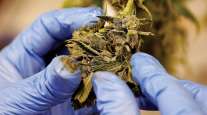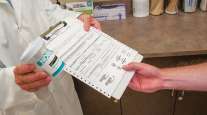Senior Reporter
DOT Proposes Adding Oral Fluid Specimen for Driver Drug Testing

[Stay on top of transportation news: Get TTNews in your inbox.]
The Department of Transportation is proposing to add new drug testing guidelines that would permit motor carriers to test truck drivers using oral fluid samples as an alternative to urine testing.
“This will give employers a choice that will help combat employee cheating on urine drug tests and provide a more economical, less intrusive means of achieving the safety goals of the program,” DOT said Feb. 25 in a 119-page pre-publication Federal Register announcement. “Unlike directly observed urine collections, an oral fluid collection is much less intrusive on the tested employee’s privacy.”
The proposal also updates other provisions to DOT drug testing regulations, and is intended to “harmonize” mandatory oral fluid testing guidelines established in 2020 by the U.S. Department of Health and Human Services, according to the announcement.
2022-02364 by Transport Topics
The proposal does not address testing for excessive alcohol use.
The agency did not say when the proposal might be effective, but said it is accepting public comment on its proposal for 30 days. “Specifically, we are seeking comments as to whether there are circumstances where either urine or oral fluid should be mandatory,” DOT said.
“In proposing oral fluid testing, the department is offering an alternative specimen for drug testing; however, we are not proposing to eliminate urine drug testing.”
“We are elated that DOT is proposing the inclusion of oral fluids as an approved testing method for DOT purposes,” said Dan Horvath, American Trucking Associations vice president of safety policy. “ATA has long advocated for its inclusion, and the notice today is another step closer in getting it done.”

Horvath
Horvath added that ATA’s safety team is in the process of reviewing the proposal, and will be working with its safety policy committee to formulate comments on what situations may be most appropriate for oral fluid testing.
The proposal notes that if an employer is looking to detect recent drug use in the case of reasonable cause or suspicion of drug use by an employee, or in cases of post-accident testing, an employer may find that the more immediate window of detection associated with oral fluid is acceptable.
“However, if an employer is looking to detect a pattern of intermittent drug use through pre-employment, random, return-to-duty, or follow-up testing, the delayed windows of detection in urine may be preferable,” DOT said.
DOT said that when an employer determines that a post-accident or a reasonable cause-suspicion test is needed, oral fluid collections could be done at the scene of the accident or the incident. The collection could be done by any oral fluid collector qualified under federal regulations — either an external contractor or a DOT-regulated company employee.
In addition, an oral fluid test may be an option in cases where urine collection events involve an employee’s inability to provide a sufficient specimen, the agency said.
DOT also noted that oral fluid testing is generally less expensive than urine testing. “We understand that an oral fluid test can cost between $10 to $20 less than a urine test,” DOT said. The proposal estimated that the overall urine testing process typically costs $50, as opposed to about $35 for a oral test.
DOT — as well as aviation, rail and transit agencies — are required by the Omnibus Transportation Employee Testing Act of 1991 to incorporate the HHS testing mandate for safety-sensitive employees, a category that includes truck drivers.
“While DOT has discretion concerning many aspects of its regulations governing testing in the transportation industries’ regulated programs, the agency follows the HHS mandatory guidelines for the laboratory and specimen testing procedures,” the proposal said.
Want more news? Listen to today's daily briefing above or go here for more info
“The collection of oral fluid is less invasive than directly observed urine collection and, therefore, is consistent with the careful balancing of an individual’s right to privacy with the department’s strong interest in preserving transportation safety by deterring illicit drug use.”
A 2019 federal appeals court decision affirmed DOT’s enhanced direct observation procedures to prevent the use of prosthetic devices used for cheating and to expand direct observation to tests of people who had already violated the rules, including return-to-duty and follow-up tests for people who had tested positive or refused to test.
The proposal noted that on Sept. 10, 2020, HHS published a notice of proposed mandatory guidelines to add hair testing to drug testing specimen types. However, it provided no information on when HHS might issue a hair testing final rule.




